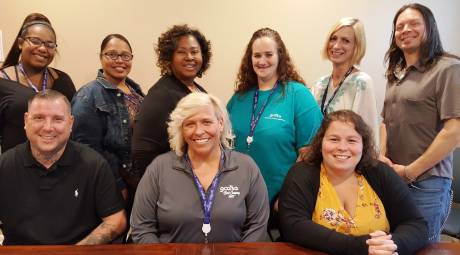
Unlike a courtroom jury of your peers, the team of Peer Recovery Advocates at Genesee/Orleans Council on Alcoholism and Substance Abuse is not there to pass judgment, but to provide much-needed support and encouragement to those struggling with substance use disorders.
For the past 13 months or so, about a dozen Peers at GCASA have bonded into a motivated, close-knit group that has had a positive impact on hundreds of people at various stages of recovery.
All of these professionals have lived through recovery – most of them are in recovery themselves. Knowing what it takes to reach and sustain sobriety, they now are sharing with others in need of what they have experienced and learned.
“Living with substance use disorder – either personally or dealing with a family member – gives Peers the tools to aid in others’ road to recovery,” said Rosalie Mangino-Crandall, director of project innovation and expansion who also serves as director of the recovery programs at GCASA.
Mangino-Crandall explained that specific training requirements must be met to become a Peer.
“There is a required six-day training for CRPA-P (Certified Recovery Peer Advocate-Provisional), then there are 500 field hours and 25 supervision hours that must be completed to become a CRPA,” she said. “GCASA LOCAL Peer onboarding and training program lasts one to two months. In that time, Peers go to trainings and do work that applies toward the credential.”
She added that it takes at least four months at GCASA to have enough hours to be credentialed, however, and can take longer depending on full-time equivalent hours per week, job assignments and other factors.
There also is a test that must be passed to become a CRPA. Re-credentialing is required every three years with 30 more hours of training.
Mangino-Crandall said all but one of the Peers is full time, with funding derived from a variety of grants.
Apparently, GCASA’s program is paying off in big ways as its Peers have reached out to more than 1,200 people in recovery over the past year. The positive results include the following:
-- Improved relationship with treatment providers;
-- Increased treatment retention;
-- Increased satisfaction with the overall treatment experience;
-- Improved access to social supports;
-- Decreased criminal justice involvement;
-- Reduced relapse rates;
-- Reduced substance use and greater housing stability.
“We’re here to support our clients in whatever pathway they are choosing (to reach and maintain recovery), said Charlene Grimm, the Peer supervisor who assumed that role in August 2018 after nearly 10 years as a counselor and Supportive Living coordinator.
Grimm, in recovery for 19 years, said her history made it a “good fit” for her to become a Peer leader.
“I have years of experience with the agency, I’m from this area and I know the community,” she said. “All of us understand that we’re equals in one sense but we have ethical standards that enable us to mentor them and support them.”
According to guidelines from the Substance Abuse and Mental Health Services Administration, Peer Recovery coaches walk side by side with individuals seeking recovery from substance use disorders. They help people to create their own recovery plans, and develop their own recovery pathways.
Recovery coaches such as Grimm and Nicole Anderson, a Genesee-Orleans-Wyoming Task Force Peer Recovery Advocate, perform the day-to-day tasks necessary to move the recovery process along – things such as linking clients to food and social services’ sources; providing transportation to medical appointments, meetings and church services; attending court sessions, and offering coaching and motivational support.
“The Peer program allows people to know that they don’t need to walk through this alone,” said Anderson, whose stepfather passed away due to a heroin overdose. “We celebrate little victories and continue our support even if they take a step back. We’re friends on a professional level and we’re here to listen.”
Chris Budzinack Sr. is another Peer Recovery advocate who began employment at GCASA after working at City Church.
A married father of three teenage boys, he has been in recovery for 10 years. He said he owes his life to the people that reached out to him and just wants to pay it forward.
“I wouldn’t be here today if it weren’t for those who helped me and supported me,” he said. “Now, we as a team have made a difference. It’s not 'do we think we have' – I know we’re making a difference.”
With such a highly trained team on hand, GCASA is set up well to move into its recovery recreation center at the former Bohn’s Restaurant on Clinton Street Road later this fall. Several of the Peers will be assigned to the recovery center, with Budzinack serving as the Lead Peer at that location.
“Batavia can become an amazing recovery community,” he said. “Right now there is no place for people to go to socialize without alcohol. There is so much potential (with a place like that).”
Grimm said Peers also support the residential clients of GCASA -- people currently at the Atwater House and those in supportive living -- and can utilize a fleet of vehicles acquired from grants to transport clients as needed.
“One of the key reasons for its success is that it offers a lot of things needed outside of the clinical setting,” Mangino-Crandall explained. “The Peers offer more flexibility and can provide essential support with other non-clinical elements of recovery.”
She added that the Peer program is expanding.
“Yes, we’re looking for a few more Peers,” she said.
For more information about the Peer program at GCASA, go to the agency’s website – www.gcasa.net.
Disclosure: Story by Mike Pettinella, GCASA publicist.
Photo: The GCASA Peer team – front from left, Chris Budzinack, Charlene Grimm, Gina Schelemanow; back, Cheyenne Richardson, Madeline Rodriguez, Sheila Smith, Nicole Anderson, Amy Kabel, Nick Volpe. Other team members are Trisha Allen, Shawn Kitcho and Marty Taber.
